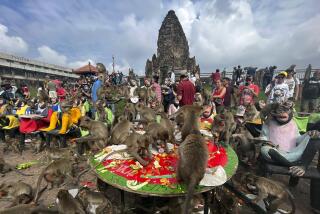U.S. Considering New Weapon in Its War on Narcotics: Drug-Sniffing Mongooses
- Share via
WASHINGTON — The State Department is considering recruitment of an unusual ally in the war on illegal narcotics: the mongoose.
The U.S. Embassy in Sri Lanka has proposed a one-year, American-financed pilot project--code-named Operation Mongoose--to train a squad of the small, weasel-like mammals for use in the tropics to sniff out drugs.
In a cable last week to Secretary of State George P. Shultz, the embassy recommended that a test group of mongooses be trained in Sri Lanka to replace the German shepherd dogs used at the international airport in Colombo to intercept drugs.
Describing the proposal as “a positive alternative to a difficult problem,” the embassy suggested that the training program “could have a significant impact on the worldwide anti-narcotic effort.”
Natural Hunters
The embassy said that a successful pilot project in Sri Lanka, an island nation in the Indian Ocean, “could have important repercussions in many other countries around the globe,” especially if the mongoose squad proved able to branch out into explosives detection and searches for other smuggled goods and contraband.
The mongoose, common in Asia and Africa, is known for its ability to kill rats and venomous snakes. Although mongooses historically have been tamed and kept as pets, federal drug authorities, who asked to remain anonymous, could recall no instance of a mongoose being used to hunt narcotics.
The cable described mongooses as animals that are “cheap to obtain and keep, are intelligent and possess a keen sense of smell, and are culturally acceptable to Muslims and other groups who object to dogs.”
It said that the 12 drug-sniffer dogs in Sri Lanka have been unpopular because “Sri Lanka’s million-strong Muslim community, like Muslims elsewhere, considers dogs to be unclean, lowly animals. Police . . . say many Sri Lankan and visiting Muslims violently object to dogs sniffing through their luggage and other personal effects.”
Dogs Disliked
The embassy added that there are no strong bonds between the dogs and their Sri Lankan handlers. “Sri Lankans are as likely to consider a water buffalo or an elephant as being ‘man’s best friend’ as they are a dog,” the cable to Shultz said.
According to the embassy cable, the dogs’ food, handling and veterinary bills are considered “extremely expensive by local standards.” Because of the heat, humidity and lack of air conditioning, nine of the 12 dogs are kept in the cooler hill area, and a group of three is rotated for airport duty. On the other hand, the embassy cable said, “mongooses function well in the tropics.”
The embassy asked for initial funding of $10,000 for “purchase, upkeep and training of a number of mongooses” and for local personnel. It also asked for the U.S. government to provide a technical adviser on a temporary basis.
The cable said that the Sri Lankan zoo “has an animal trainer who is very experienced with other small animals and who could provide regular zoological expertise, but would need technical input from outside,” it said.
The State Department had no immediate comment on Shultz’s reaction to the mongoose proposal.
More to Read
Sign up for Essential California
The most important California stories and recommendations in your inbox every morning.
You may occasionally receive promotional content from the Los Angeles Times.













